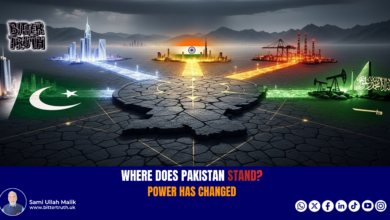The Oppressed of Medina…Hazrat Uthman Ghani
History tells its truth
I do not wish to argue with history. If history claims that the water supply to Hazrat Hussain and his family was cut off for 10 days, that’s fine. If it claims it was cut off for 7 days, that’s also fine. My belief is that even if Hazrat Hussain’s water was not cut off, the grandson of the Prophet is still oppressed. However, instead of tampering with history, when I study it, I see that the martyrdom of Hazrat Hussain is not the only painful or tragic martyrdom in the history of Islam. If we read about the events of 18th Dhu al-Hijjah on our way to the 10th of Muharram, we come across another martyrdom—that of Hazrat Uthman. Yes, the same Hazrat Uthman whom we call Dhul-Nurayn, the same Uthman whom we refer to as the son-in-law of Mustafa, the same Uthman who is known as the Publisher of the Quran, the same Uthman who is the third Caliph, the same Uthman who bore all the expenses for the wedding of Hazrat Ali, the same Uthman for whose protection Hazrat Ali sent his son Hazrat Hussain, the same Uthman who had the honor of being twice the son-in-law of the Messenger of Allah and earned the title “Dhul-Nurayn.”
Moreover, the third Caliph, our revered Uthman Ghani, belonged to the noble tribe of Quraysh, tracing his lineage to Abd Manaf, who connects him to the Messenger of Allah. Uthman Dhul-Nurayn’s grandmother was the Prophet’s aunt. He was among the first to embrace Islam, included in the list of “As-Sabiqun al-Awwalun (The first to accept Isla .” On the invitation of the first Caliph, Abu Bakr Siddiq, he believed in the Prophet and recited the declaration of faith. As a result, his uncle, Hakam bin Abi al-As, bound him with iron chains and imprisoned him in a separate house under the scorching sun of Mecca for several days, offering freedom only if he renounced the new religion (Islam). In response, displaying immense courage and steadfastness, Uthman replied, “Uncle! By Allah, I will never abandon Islam and I will never relinquish the wealth of faith.”
Hazrat Uthman Ghani was known for his excellent character and generosity. The Messenger of Allah said that every prophet will have a companion in Paradise, and my companion will be Uthman. After embracing Islam, the Prophet gave his daughter Ruqayyah in marriage to Uthman. When the Muslims, tormented by the disbelievers of Mecca, migrated to Abyssinia with the permission of Allah and the Prophet, Uthman also migrated with his wife Ruqayyah. When Ruqayyah passed away, the Prophet gave his second daughter, Umm Kulthum, to Uthman in marriage, granting him the title “Dhul-Nurayn.” In Medina, during a water shortage, Uthman bought a well with the Prophet’s permission and dedicated it to the Muslims. Similarly, during the Battle of Tabuk, when the Prophet called for financial assistance, Uthman took responsibility for a third of the expenses for thirty thousand soldiers. When the Prophet intended to visit the Kaaba, it was learned at Hudaybiya that the Quraysh were ready for war. The Prophet sent Uthman as an envoy to Mecca. The Quraysh detained him, leading to rumours that he had been martyred. At this point, the Prophet took an oath from fourteen hundred Companions to avenge Uthman’s death. This pledge is known in Islamic history as the “Pledge of Ridwan.” When the Quraysh realized the true situation, they agreed to peace, and Uthman returned safely.
However, today, while we often recount the virtues and character of Hazrat Uthman, mentioning his modesty and the events of his life before and after Islam, we unfortunately do not bring to light the tale of his tragic martyrdom and oppression. This deliberate omission is the greatest injustice. I honestly believe that history cries out at the mention of Hazrat Uthman’s oppression and exclaims, “Oh, Uthman!” My heart sinks when I learn that Uthman was the oppressed one whose water supply was cut off for 40 days. My heart beats irregularly when I imagine Uthman, who once bought wells for the Muslim community, dying of thirst. I feel suffocated reading that when Hazrat Uthman, in prison and weakened by thirst, called out, “Is there anyone to give me water?” Hazrat Ali, upon hearing this, took a water bag and went to provide water to Uthman. Today, the arrows that rained on Ali Asghar in Karbala are mentioned, but not the arrows that were shot at the water bag of Hazrat Ali. When the rebels started shooting arrows at Hazrat Ali’s water bag, Hazrat Ali threw his turban into the air so that Uthman could see it and not complain to Allah on the Day of Judgment that there was no one to give him water. If in Karbala, Abbas was the water bearer for Hussain, then in Medina, Ali was the water bearer for Uthman.
Today, as I write this, my pen trembles to note that it has been 40 days since the siege of Uthman’s house, the same Uthman who used to purchase land for the Prophet’s Mosque.
Alas, Uthman! Today marks the 40th day, and Dhul-Nurayn cannot meet anyone, he whose gatherings were frequented by companions in large numbers. Today, for 40 days, the coolness of the Prophet’s eyes, Hazrat Uthman, has not received food, he who used to present camels loaded with grain to the Prophet. The heavens have witnessed the cruelty that today, the blessed beard of Uthman, which even the angels revered, is being pulled. Today, that same Uthman who once protected the Prophet during the Battle of Uhud, standing as a shield against the arrows aimed at him, is subjected to extreme cruelty. His hand, which pledged allegiance to the Prophet, was cut off.
Alas, Uthman! I am not a scholar, nor a preacher to describe your martyrdom. I am not eloquent enough to praise you, nor am I articulate enough to paint a picture of your martyrdom that would make the listeners and readers’ hearts break and eyes wet. How can I express the harsh reality that today, the ruthless, heartless criminals have pierced the body of Uthman with a spear, leaving him bloodied, the same Uthman who, even in illness, never bathed without clothes. Today, the husband of two daughters of the Prophet is being brutally kicked.
Let us try to visualize this entire situation: It is the 18th of Dhul-Hijjah, 35 AH, a Friday. Hazrat Uthman is fasting and reciting the Quran. The rebels scale the wall and enter, cursing him and pulling his blessed beard. Suddenly, a wicked rebel strikes him on the back with a spear, another hits his head with an iron rod, and a third cuts off his hand with a sword. The same hand that pledged allegiance to the Prophet. Blood from that hand falls on the Quran, making it a witness to Uthman’s martyrdom. Uthman falls to the ground, and the rebels start kicking him, breaking his ribs. Hazrat Uthman, martyred by this brutal assault, departed to join his master, the Prophet, before Hazrat Ali and the Prophet’s grandson.
When I think of this, my mind feels like it is about to burst, pondering what my master, the Prophet, would have pleaded to his Lord upon seeing the blood-soaked body of his Dhul-Nurayn, Hazrat Uthman. What would have gone through his heart holding Uthman in his arms? If on the Day of Judgment, when faced with severe thirst at the Haud al-Kawthar, the martyrdom of Uthman is mentioned and it is asked why you were not among those who offered condolences, what will those who hid the mention of Uthman’s martyrdom answer?
اسلام وہ شجر نہیں جس نے پانی سے غذا پائی
دیا خونِ جگر صحابہؓ نے تو گلشن میں بہار آئی
Islam is not a tree nourished by water.
It blossomed in the garden with the blood of the companions
Tuesday 25 June 2024






